Corporate offices feature a variety of workspaces that require their own unique solutions for improving worker comfort, productivity, and speech privacy. Modern open offices contain far more reflective materials, such as glass and wood, than ever before. Then, combine those factors with more benching and less private offices. While these changes have made workplaces more aesthetically pleasing and collaborative, it has also affected the acoustics. Sound Masking products from Cambridge Sound Management helps improve the acoustic environment. This enables employees to feel more comfortable and less distracted at work.
Challenges
Cambridge Sound Management Sound Masking Systems
Read more to see how a sound masking system by Cambridge Sound Management compares to other acoustic treatment options.
What is Sound Masking?
Sound masking is the process of adding a low level, unobtrusive background sound to an environment to reduce the intelligibility of human speech and reduce noise distractions in that environment.
The sound is typically introduced through speakers installed in or above the ceiling.
Sound Masking is used in public buildings, large open office space and noisy work environments where distractions in the workplace cause reductions in productivity.
Sound Masking is the process of adding to an environment a low level of unobtrusive background sound engineered to protect confidentiality and reduce distractions by reducing the intelligibility of speech, thus making the acoustical environment more comfortable.
A well executed sound masking system will improve confidentiality, improve concentration and lead to increased productivity as less time is lost overhearing casual conversation or intrusive noises.
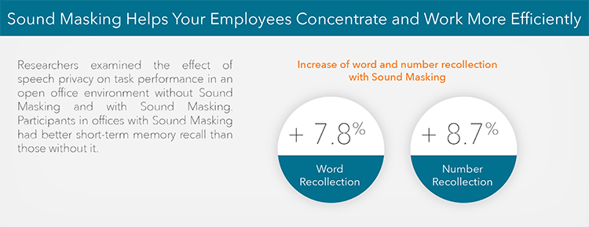
Generation Digital are experts in Sound Masking and can advise, design and support in this often challenging and confusing area. We partner with the worlds leading manufacturers to deliver world class Sound Masking solutions.
Originally used only in offices and call centers, sound masking now benefits visitors and employees alike in hospitals, medical and dental clinics, bank branches, military facilities, libraries, hotels, and a whole host of other applications.
What is Sound Masking?
In many environments that require speech privacy, employee concentration, or both, there’s simply not enough background sound (also called ambient sound), leaving occupants trying to work in a pin-drop environment. In fact, the background sound level in most offices is so low you can easily hear conversations and noise from up to 50 feet (15 meters) away.
These distractions make it difficult to concentrate. It takes more effort to focus, which tires you out, affecting your mood and, ultimately, your productivity. What’s more, confidential conversations can easily be overheard, making employees and visitors nervous about talking.
Sound masking addresses these problems.
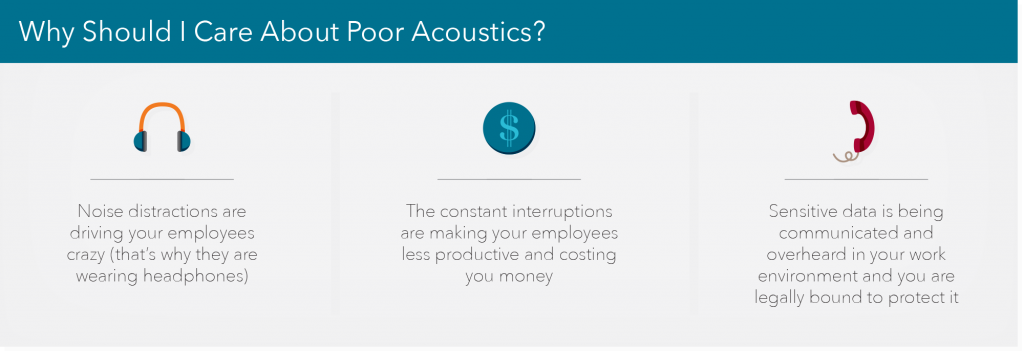
At its most basic, a sound masking system consists of a series of loudspeakers installed in a grid-like pattern in the ceiling, as well as a method of controlling those speakers’ output.
The loudspeakers distribute an engineered background sound, raising the facility’s ambient level in a highly controlled fashion.
Benefits of sound masking
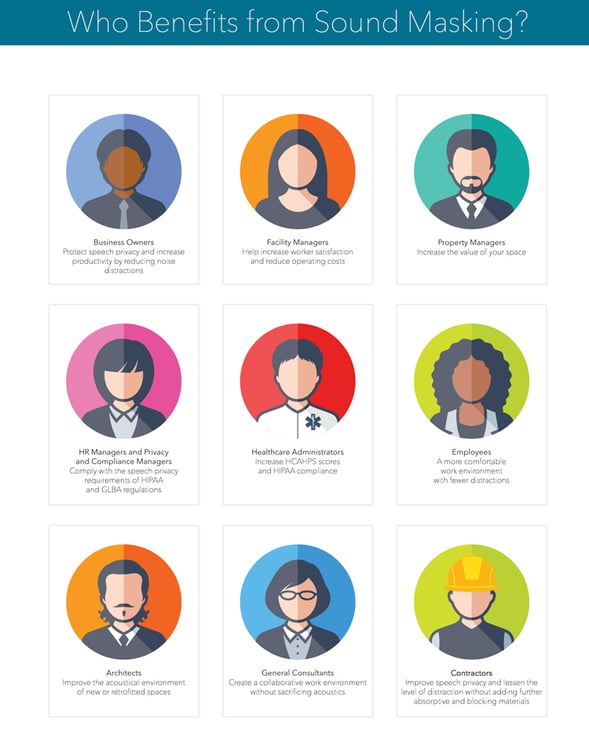
Sound Masking and Acoustic Design
Sound masking is a critical component of acoustic design. When designing an optimal acoustic environment, architects consider a variety of elements to address noise control and speech privacy. Elements added either Absorb, Block, or Cover sound, and are collectively called the ABC’s of acoustic design.
All of the ABC’s of acoustic design can be used together or individually to achieve the desired acoustic environment, but absorbing materials (carpet, ceiling tiles, etc.) and blocking structures (walls, cubicle partitions, etc.) are costly and underused, particularly in modern offices. Sound masking, on the other hand, is a low-cost option for creating acoustical environments that both reduce noise distractions and protect private conversations.
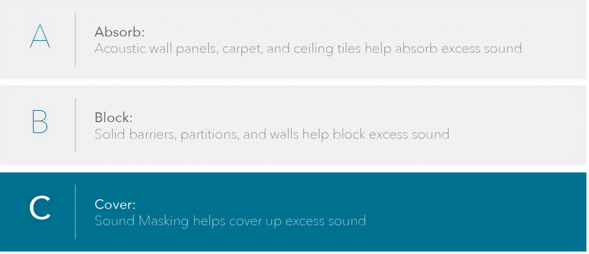
How does sound masking work?
Sound masking works by raising the ambient noise level of an environment and making speech noise less intelligible and therefore less distracting.
Adding sound to a space actually makes the space seem quieter. It sounds counter-intuitive but it’s true. This is because the added sound reduces the intelligibility of human speech. When you can’t understand what someone is saying, their words are less distracting — in fact, you probably don’t even notice them.
Here’s an example of Sound Masking in everyday life. Have you ever had a conversation with someone while you are washing dishes and they are on the other side of the kitchen? When the water isn’t running, you can hear the other person’s words perfectly. When you turn the water on it becomes much harder to hear them and understand what they are saying. The person isn’t speaking more softly, but they sound as if they are. This is because the noise of the running water is “masking” the sound of the person speaking to you.
Sound masking mimics this phenomenon on a much more sophisticated and effective scale. By adding an ambient sound to an environment that’s specifically engineered to the frequency of human speech you can target conversational distractions and make them less distracting. Sound masking doesn’t eliminate all speech noise in an environment; it simply reduces the area where human speech is intelligible and distracting. We call this area the radius of distraction. Sound masking generally can cut down on the radius of distraction by a factor of 3 or more.
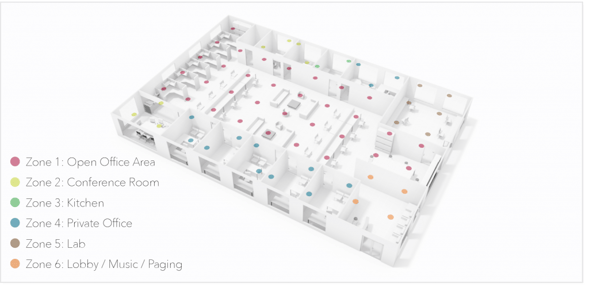
What does sound masking sound like?
If deployed properly sound masking should be barely noticeable and sound similar to the sound of gentle airflow. Generally it should blend into the background of a workplace and contribute to workplace’s general ambiance. Contrary to some misconceptions, sound masking is not “white noise.” White noise’s frequency is actually something that, when amplified, would be extremely unpleasant to listen to (think of a radio station playing nothing but static).
How is it different than White Noise?
Sound masking is different than white noise because it is on a different part of the sound curve, specifically on the same sound curve as human speech. This has two benefits. First it effectively masks human speech, and secondly sound masking is easier on the ears since we are conditioned to listen conversational noise. Sound masking is effective and at a more comfortable frequency range than white noise. Since we are used to the frequency of human speech and sound masking is at the frequency of human speech, sound masking is more comfortable acoustically.
Why Sound Masking?
Lack of speech privacy is the primary driver of worker dissatisfaction in the open office. Sound masking can help make your workplace more acoustically comfortable.
Reduce Noise Distractions
Lack of Speech Privacy is the primary driver of worker dissatisfaction in the open office. Sound masking can help make your workplace more acoustically comfortable.
Increase Focus and Productivity
Employees are interrupted by speech once every 11 minutes* and waste an average of 21.5 minutes a day due to conversational distractions**. Sound masking can help you get those minutes back.
Protect Private Conversations
53% of employees report having overheard confidential company information at the office***. The lack of speech privacy can result in compliance and legal concerns when workers are discussing private customer information such as finance or healthcare records. Sound masking can help companies protect confidential customer, company, and employee information.
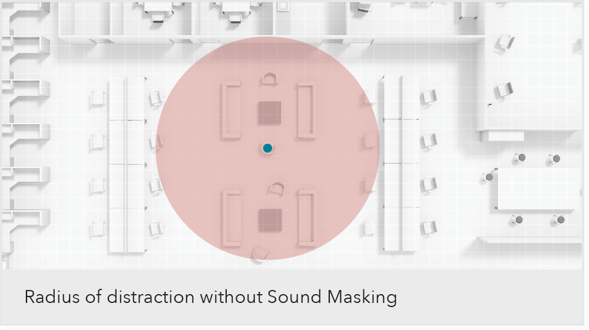
When designing an optimal acoustic environment, architects consider a variety of elements to address noise control and speech privacy. Elements added either Absorb, Block, or Cover sound, and are collectively called the ABC’s of acoustic design.
All of the ABC’s of acoustic design can be used together or individually to achieve the desired acoustic environment, but absorbing and blocking materials are costly and underused. Sound Masking, on the other hand, is a low-cost option for creating acoustical environments that both reduce noise distractions and increase speech privacy.
Most workplaces today feature more open spaces and smaller, and often shared, workstations. Less sound absorptive materials are being used such as lower or non-existent partitions, hard or glass surfaces, and thinner walls and doors. This creates acoustical challenges that negatively impact workplace satisfaction, productivity, and speech privacy.
Employees are interrupted once every 11 minutes according to research from UC Irvine, and it takes them up to 23 minutes to get back into the flow of what they were doing before they were interrupted.
In a recent study presented to the International Congress of Noise as a Public Health Problem, researchers found that on average employees wasted 21.5 minutes per day due to conversational distractions, making lack of speech privacy the number one cause of reduced productivity. An additional 2014 Steelcase/Ipsos study found that employees lost as much as 86 minutes per day due to noise distractions.
Approximately 24,000 office workers in private offices, shared offices, cubicles, and open offices were asked to rate their satisfaction with their noise and speech privacy levels. Those with private offices were the only ones satisfied with their speech privacy, and even they only rated them a .55 out of 3 on average.
Closing the door to an office no longer guarantees speech privacy, in fact, it’s probably worse because closing that door provides the illusion of privacy. Many private conversations can be HR nightmares if overheard by the wrong people.

Our experts can help you plan, install and integrate leading Digital, Cloud and Audio Visual Technology including Sound Masking.
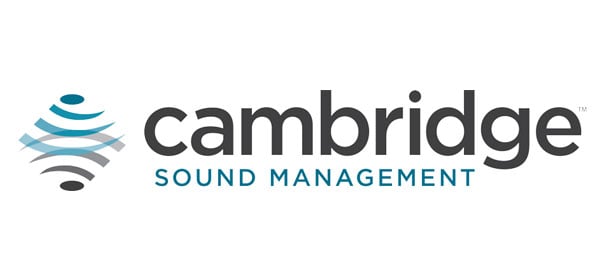
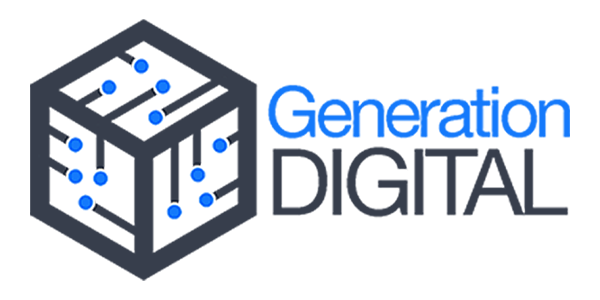
Evoko Liso makes it easier than ever to book a room with your favorite digital calendar, or directly on the screen using your fingertip. Now we are taking the intuitive user interface to a whole new level that brings form and fucntion.
All information is elegantly presented on the screen and it actually changes information on the display when someone walks up to it (using a proximity sensor) , always displaying the most relevant information.
Book, end or extend a meeting directly from the clock or use the calendar to search for other rooms based on availability, size and equipment in your organistion. Thanks to the green and red light aura you can see at a glance if the room is vacant or not. No more confusion or double bookings!

Evoko Liso gives you full insight into your organization’s meeting patterns to really optimize resources. You get decision-making support that truly cuts cost by analyzing statistics in the web based Evoko Home – now more comprehensive than ever.
Make sure you use the perfect room for every single meeting. Evoko Home also offers extensive multisite management options with permission control and real-time monitoring of the units. It has never been easier to open the door to a much more efficient meeting culture.
The much appreciated “check in” function helps you to free up meeting space by cancelling bookings when no one shows up.
Any non-functioning equipment in the room? Simply report it on the screen.
Evoko Liso’s open API integrates smoothly with other 3rd party systems. You could, as an example, get the AC turned on 10 minutes before a meeting is scheduled to start. RFID/NFC and PIN verification enables easy identification for on-screen bookings and the possibility to restrict access for certain rooms or groups.
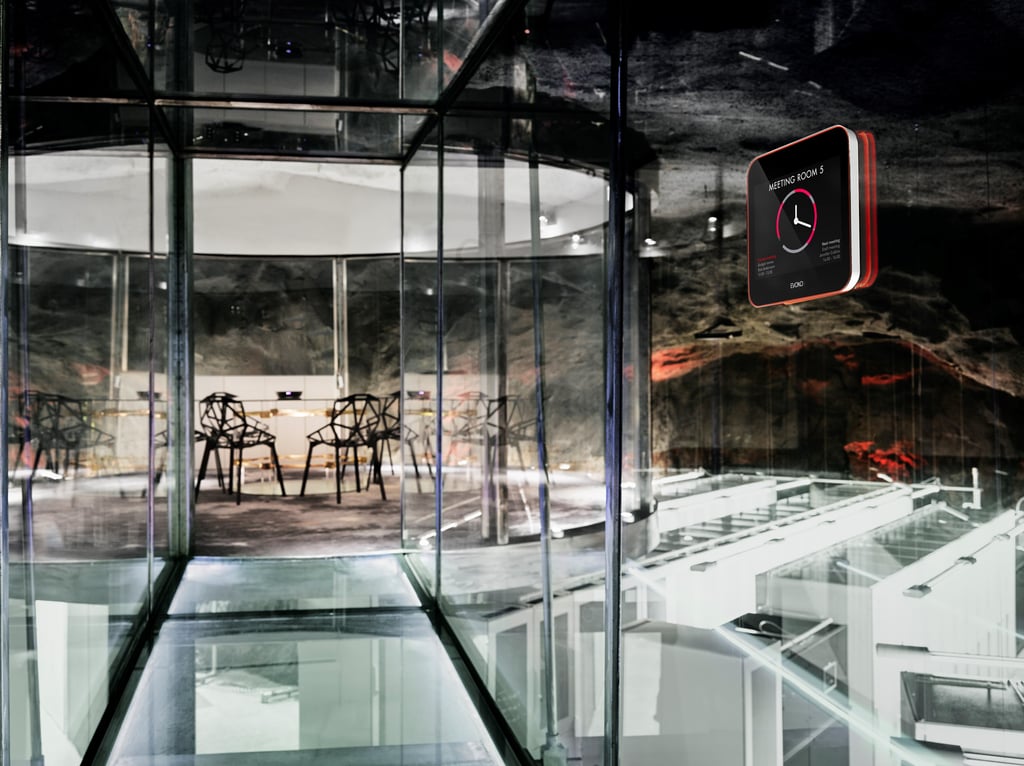
Forget about double bookings, confusion and interrupted meetings and no shows. Book conference rooms easily and then have all information presented on the Evoko Liso.
Book ad hoc meetings on the screen or use your smart phone or normal calendar software. Anyone can use it, it is that easy!
Increase the meeting room availability by using the check-in function that releases booked meeting rooms where no one show up.
Optimize the resources usage and get valuable decision making support, by analyzing statistics from the units. Open the door to a new more effective meeting culture.
Turnkey solution with everything needed included in the box. No extra hard- or software required and no license or subscription fees. A one time cost with everything included.
Remote Management for smooth configuration, updates and overview of the Room Managers.
A seamless integration to existing e-mail server. Secure, reliable and with minimal infringement to existing IT environment.

Evoko Minto is intelligent, really easy to work with and all rather gorgeous. With a remarkable ability to hear what’s important and what isn’t. All thanks to a unique sound technology. Ready for use with your mobile phone, tablet or laptop: fast tracking you to the core of the meeting. Getting the message through to everyone — wherever you are!
